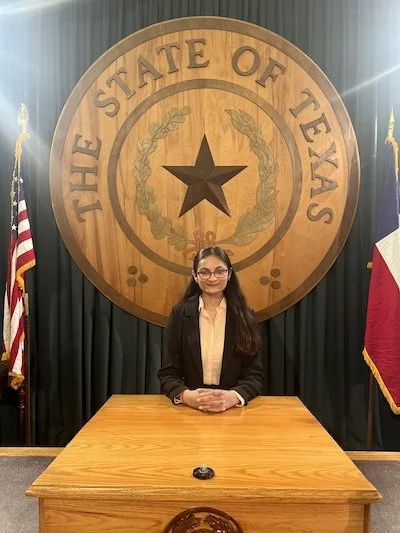Q&A with Shipra Mishra: 2025 Energy Policy Fellow
Shipra, can you start by telling us a little about yourself?
“I carry with me not just legislative experience in Texas' energy policy and procedural knowledge, but the deep appreciation of a system that—however messy—invites participation and impact.”
My name is Shipra Mishra and I am one of the Energy Policy Fellows placed in Representative Drew Darby's office for the 89th Legislative Session. I am also staffing the House Committee on Energy Resources chaired by Representative Darby. Coming from the coal belt in India, and having worked in India's massive energy sector, this fellowship was a deeply personal and professional milestone. I came to the US to study energy and environment policy, and eventually to Texas - to translate my academic background and professional experience into actual policy practice and explore the state energy policy landscape.
I aim to advance sound, informed energy policies that address growing energy demands while keeping in mind equity, accessibility, and long-term sustainability. This fellowship provided an opportunity to gain an up-close experience into the Texas Legislature and energy policy-making right at the heart of the energy capital of the world.
What led you to exploring a career in energy policy?
Where I come from, coal is commonly known as the 'black diamond', the backbone India' energy and industrial economy. Growing up, I witnessed the paradox of energy abundance and energy injustice. Coal-dependent communities still suffer from environmental degradation, poor health outcomes and power outages, while being economically dependent on mining for their survival. This paradox became more pronounced for me while working in India's Coal and Mines Ministries, where there appeared an even bigger gap between these ground realities and policymaking. My law background, while helpful in understanding its legal nuances, was not enough to fill the technical and industrial knowledge gap that should inform policy decisions. This realization sparked my interest in broader energy policy.
While working in India's energy sector, I often saw a disconnect between ministries, particularly in integrating technical expertise, policy design, and on-the-ground implementation. That gap motivated me to pursue a more global perspective. I earned my Master of Public Administration from Cornell University, focusing on energy and environmental policy. While there, I worked with the Climate Jobs Institute, where I researched labor policies tied to energy transition and conducted legislative research on permitting and siting renewable energy projects across multiple states. That work opened my eyes to the local-level challenges renewable energy development faces in the U.S: from permitting delays to community resistance to infrastructure constraints. While there is a global consensus on advancing clean energy solutions, local challenges tell a different story. These experiences further solidified my belief that inclusive and resilient energy systems must be informed by people who understand both ground realities and systemic challenges. This fellowship was a huge step forward in my journey about bridging those two worlds.
What have you been working on during this legislative session?
In Chairman Darby’s office, I’ve had the opportunity to learn and work on energy policies across all energy sources. As Assistant Committee Clerk of the House Committee on Energy Resources, I reviewed bills on oil & gas well plugging, produced water, hydrogen, geothermal and more. As my boss sat on the State Affairs Committee, I worked on all energy and electricity-related bills, including our battery decommissioning bill, large load planning, interim rates, and residential solar consumer protection. I prepared legislative hearing summaries, drafted bill layouts (speeches) and talking points, and participated in stakeholder engagement involving utilities, environmental groups, industry representatives and state agencies. Being part of the policy process from research to committee hearing to the bills passing on the House and Senate floors was incredibly rewarding.
Through the State Affairs Committee I had the opportunity to learn about issues related to dispatchable generation, reliability standards, and transmission constraints. I'm grateful for the deep-dive I got into the transmission and infrastructure related challenges of energy planning. What was really interesting to me was all the parallels I was able to draw between the energy policy landscape in Texas and the work I did back in India. While Texas is decades ahead in addressing the challenges that come with growing energy demand, grid infrastructure, and electrification, there are administrative, political, and technical challenges that remain similar across these disparate jurisdictions. I’ve learned that energy policy isn’t just about megawatts, generation, and more electrons on the grid, it’s also about transmission planning, grid reliability, and consumer costs - people, priorities, and place; and again, every effort matters.
Apart from all the energy policy work I did, navigating the Capitol itself was a fascinating learning curve. I was struck by how young the building is, full of kind 20-somethings with immense responsibilities. I was equally surprised by how seriously some members and staff approach learning. Most Members I had the opportunity to interact with, especially on the Energy Resources Committee, were always open to thoughtful policy discussions. That was a refreshing experience: I’m now hopeful that there are truly some voices and proponents of sound, informed and bipartisan energy policy in Texas. Of course, politics shapes every conversation, but I also saw moments of thoughtful bipartisanship and rigorous debate - moments of policy over politics.
What have been your most valuable takeaways so far?
One of the most valuable aspects of my Energy Policy Fellowship was understanding just how important rules and procedures are in the legislative process. In a building full of the executors and experts, very few truly master the House rules, committee procedures, and floor processes. While contributing to good energy policies and understanding policy issues was an essential part of my role, I came to realize that it’s the knowledge of the rules that actually moves bills forward or stops bad bills from moving forward. Whether it's advancing a strong, thoughtful energy bill or helping kill a bill/policy that could hurt industry or communities, knowing how the system works makes all the difference. In my office, I got the opportunity to study those rules, understand how to read them, and learn how to apply them. That experience - learning the "how" behind the "what" has been the most valuable part of my fellowship.
I'm fortunate that I got an opportunity to work with Representative Darby - who is not only a leader in partisanship-free Texas' energy policy but is also an excellent statesman. My biggest lesson from working with him was seeing the importance of principle-driven leadership. How staying grounded in facts, listening to all sides, and leading with integrity can earn respect and build lasting impact and relationships. These qualities, in turn, are what ultimately lead to good public policy, even in a deeply polarized environment.
While many of our efforts had positive end results (passing, resulting in sound public policies), several bills died. This again was an important lesson: not all our efforts result in tangible, implementable laws, but every effort is a step forward. Texas, with its vast resources and independent spirit, is uniquely positioned to lead on clean energy, but it also struggles with legacy systems and political headwinds. One of the challenges this session, from an energy policy perspective, was that we were not only trying to pass sound energy policies focused on more generation, large load planning, transmission and grid, but also fighting against bad energy bills that would've been detrimental to specific industries. This fellowship gave me an opportunity to be a part of that balancing act.
Looking ahead, what’s next for you?
As I look ahead, I hope to continue working at the intersection of policy, energy, and industry whether in Texas, back in India, or on global platforms. This fellowship has reinforced my belief that small efforts have big impacts, and good policy can change lives, but only if it’s rooted in reality and driven by collaboration. I carry with me not just legislative experience in Texas' energy policy and procedural knowledge, but the deep appreciation of a system that—however messy—invites participation and impact. Most importantly, I am taking with me the lessons I learnt from a great statesman–Representative Darby–and the wonderful staff I worked with throughout this Session.




